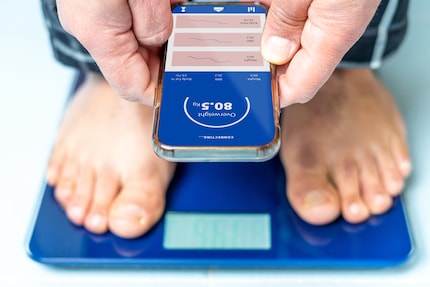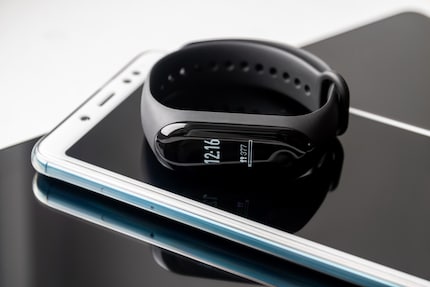
Smartphones, fitness trackers and human support: how to lose weight successfully
Step and calorie counters, weight loss apps and workout reminders - modern smartphones are packed with features designed to help you lose weight. But do they actually do that? A recent study shows that technology alone is less effective than human support when it comes to weight loss.
It could be so simple: The smartphone registers my calorie consumption, my activity level and my weight and gives me tips on how to shed excess pounds faster. So I always have the virtual weight loss coach in my pocket. And success is almost guaranteed. Right?
This or something similar is what researchers at Northwestern University Feinberg School of Medicine in Chicago had in mind. They tested their hypothesis with a study involving 400 overweight adults aged between 18 and 60. The study, entitled "An Adaptive Behavioural Intervention for Weight Loss Management", has just been published in the journal Jama.
Two groups with or without human support
Half of the participants were asked to lose weight using a wireless feedback system consisting of a Wi-Fi scale with weight and body fat measurement, a Fitbit tracker and an integrated app that provided tips for healthy weight loss.
The other 200 people received targeted weight loss coaching in addition to the technology. They were supported by specialists who advised them by phone on questions, motivated them and tracked their progress.
Technology cannot yet replace coaching
The result: the people who received human counselling were more likely to achieve significant weight loss than those who had to rely on technology alone. The researchers define significant weight loss as when the participants lose at least five per cent of their body weight.

Source: Shutterstock
Although the people from the technology group were also accompanied by a human coach at a later stage, the advantage of the group that received human support from the beginning did not equalise even after six months.
Researchers are working on AI-based, more useful interventions
"At this point, the average person still needs a human coach to achieve clinically meaningful weight loss goals because the technology is not yet sufficiently developed," said study author Bonnie Spring, director of the Center for Behaviour and Health and professor of preventive medicine at Northwestern University Feinberg School of Medicine, in a media release. "We may not be that far away from having an AI chatbot that can replace a human, but we're not quite there yet. It's within reach. The technology is developing very quickly."

Source: Shutterstock
In fact, development in this area is progressing rapidly. As a next step, scientists are trying to understand why human counselling is so successful and how AI can better imitate humans. This is not just about content, but also about the emotional tone, the context and the best way to motivate a person individually.
Around 25 per cent of those who wanted to lose weight managed to achieve the desired weight loss of five per cent without telephone support. If you would like to try out for yourself whether you are one of them, you can find a selection of scales, fitness trackers and smartphones in our range.
Research diver, outdoor guide and SUP instructor – I love being in, on and around water. Lakes, rivers and the ocean are my playgrounds. For a change of perspective, I look at the world from above while trail running or flying drones.
From the latest iPhone to the return of 80s fashion. The editorial team will help you make sense of it all.
Show all